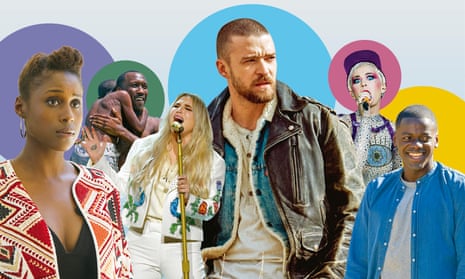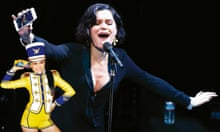A quick quiz: what do these have in common? Katy Perry’s “purposeful pop”; the reboots of Party of Five and Ghostbusters; Macklemore; that Kendall Jenner Pepsi ad; and, most recently, Justin Timberlake’s video for his song Supplies, where the star surveys the ills of today’s world on TV screens before heading off to party at what looks like an Occupy-chic rave.
The answer is: they are all, apparently, woke.
But who isn’t woke these days? The term, once linked to the struggle of black people in the United States – to “stay woke”, or awake, to injustices committed daily – has now come to mean the awareness of ills done against oppressed groups, and often the willingness to do something about it. It has circled around mainstream parlance for at least 50 years, but in the past tweet-heavy decade, in which identity politics has gained dominance and extra currency – and, in some cases, a greater capacity for dilution – it has become ubiquitous.
In early 2018, we are arguably at peak woke. A year into Trump’s presidency, he has become the nightmare for most minorities that he first suggested he might – and, as a result, culture has responded. From TV dramas such as The Handmaid’s Tale to the film Mudbound, Kendrick Lamar’s Damn (and even, to some extent, this year’s UK Celebrity Big Brother), rare is the art form that doesn’t now engage with a struggle, and common is the artist who is criticised for abstaining (see Taylor Swift, whose vocal feminism clashes with her silence on Trump). And it’s responding to a consumer need. From #MeToo to #TimesUp to #BlackLivesMatter, the hashtagging, among a generation educated and empowered by the rise of social media, has been intense.

Yet suspicions linger. Is woke an easy pose? How far can it go when, as a commercial product, your No 1 benchmark of success is to sell? Not that it doesn’t have clout: see Beyoncé’s huge success with Lemonade, Get Out being the big movie hit of 2017, or the whole critical kudos accrued by Netflix and Amazon, which derives from their commissioning pretty socially conscious programming. However, mainstream culture has a tricky way of commodifying, then discarding trends. Is this a movement, or a moment?
The Grammys last month were a prime example of the difference between acknowledging woke culture and taking it on board. At first, things looked promising: a more diverse set of nominations, a performance by Kendrick Lamar and a spotlight on Kesha, whose allegations of sexual abuse have become a cause celebre. Yet on the night, most of the awards went to the defiantly middle-of-the-road Bruno Mars, and only one woman performer, of the few nominated, won a major prize. The president of Grammys organisers The Recording Academy later tried to explain away the lack of female wins with the chirpy exhortation to women artists to “step up” (he later apologised).
Quick GuideA short history of Woke
Show
1962
The New York Times ran the headline “If you’re woke, you dig it” in novelist William Melvin Kelley’s article about beatniks appropriating black culture
2008
Erykah Badu uses the phrase “I stay woke” on her song Master Teacher
2014
Urban Dictionary defines the term after the Ferguson riots
All in all, it looked like a clumsy bid to sweep everything under the carpet, which is pretty naive for an industry that has had nothing comparable yet to #MeToo. “And there are two reasons for that,” says writer Spencer Kornhaber, who has covered the topic extensively for The Atlantic. “One is that the music industry doesn’t have as much of a problem, or the other is that the music industry has a worse problem, and even more reasons why people wouldn’t be speaking about it. You would have to be pretty naive to think that it isn’t the latter.”
The first step to a genuine woke culture is obviously to just have more diverse people on our screens and radios, and let them speak in their voice. In that sense, shows such as Issa Rae’s Insecure fill the brief gloriously. Yet there is also the problem of who is behind the scenes. Kornhaber points to a recent study published by USC, which flagged up an “insane” lack of women in the music industry at every level. For instance, a sample of 300 hit songs from the last three years found that only 2% of its producers were female. It’s grimly logical, then, that more than 90% of recent Grammy nominees have been male. “To that extent, the recording academy is reflecting its industry,” says Kornhaber, “and it’s the same thing with the Film Academy, and so on.”
Hollywood is in a slightly different place, not least because it has very much had its #MeToo moment, and had the #OscarsSoWhite uproar of two years ago. The Academy does seem to have made some changes in order to make it less old, male and white, and the fruits of that could perhaps be seen in the best picture win for Moonlight last year. Then again, change is still slow: witness the cinematographer Rachel Morrison’s nomination for her work on Mudbound this year, the first ever for a woman in that category.

David Hinojosa is a producer for Killer Films, which has made the likes of Boys Don’t Cry, Still Alice and Carol. An indie unit headed by queer executives, working in both film and TV, Killer doesn’t need any lessons in going woke; it has always worked with professionals from minority backgrounds. Talking to Hinojosa, he confirms that it’s still hard to sell projects with female, black or Latin leads, even if it’s maybe getting better, but that television now provides more opportunities for them, “pound for pound”, than film. Is he noticing the talent pool becoming more diverse?
“I think so,” he says, “but it’s been incredibly incremental – very slow, very cautious. And now you’re feeling this huge swing to fix it all in one movie cycle.” This is technically great, he says, but he’s unsure if people have a plan. “My fear is that when you’re going to take on a huge existential problem, it requires a lot of thought. So an overreaction, or an attempt to fix it too quickly, is not doing anyone any good. Because if you fix it wrong, you’re gonna have people saying, ‘Well, we tried it and it didn’t work.’”
Of course, there is woke, and the parody of woke. Katy Perry, for instance, may have believed every minute of the campaign for her last album, Witness, which was sold as a new-found awakening (“My intention is so pure these days”). But if she was trying to semaphore it subtly, it was too subtle for some.
“With [her single] Chained to the Rhythm,” says Kornhaber, “she made a big deal of this ‘woke song’ – and then you listen to the song, the album, and it’s like, what are you talking about? You have to squint to get any message out of it at all.” That’s very cruel on her single Bon Appetit (with its line “Got me spread like a buffet”) surely? “Yeah, sure. It’s about GM foods!”
For many, Witness was a textbook example of how not to do it, but it didn’t stop Justin Timberlake from offering his Supplies. It seems a little kamikaze, but it was probably worth a try: both Perry and Timberlake are examples of all-American pop saucebots who probably felt they had to somehow connect with this new audience. Also, each has been vigorously gone over for past instances of cultural appropriation, the great sin of the woke decade.
In the 00s, Timberlake’s mimicking of an array of black superstars (Prince, Michael Jackson, Stevie Wonder) simply raised eyebrows. But in this decade, his actions set off a sequence of Twitter storms, because a new generation won’t give him a free pass.
“There are millennials now who are really invested in popular culture, who understand how issues of representation in the media are a matter of social justice,” says Dr Anamik Saha of Goldsmiths, University of London. “They have been greatly enabled by social media, which is allowing them to talk back and to mobilise.”
Timberlake’s response to all this has been another new song, Say Something, which bemoans his angst about having to say things – and then settles for keeping shtum. “Sometimes the greatest way to say something is to say nothing at all,” he broods. It actually is a very real type of philosophy, in that it suggests all his anxiety and awareness of what is going on, but intimates he can do nothing about it.
In that sense, Timberlake may well be on to something. The great test for woke culture this year might be whether it can progress from something internal, an awakening and “righting” of the self, to something external, engaged with things that go beyond itself and its own sense of anger or panic. In the last few weeks, Kornhaber has noticed a slew of TV shows that dwell on liberal angst in the Trump era, but don’t offer much in the way of activism, say, or comment on policies that, after all, have more tangible effects on people’s lives than a Netflix drama.
“It seems like the only thing a certain segment of pop culture is able to say right now is: ‘Ooh, gosh, isn’t it so crazy?’” he sighs.
At the time of writing, Timberlake’s album is at No 1 on the top of the Billboard album charts, and Say Something is set to be its biggest hit.








